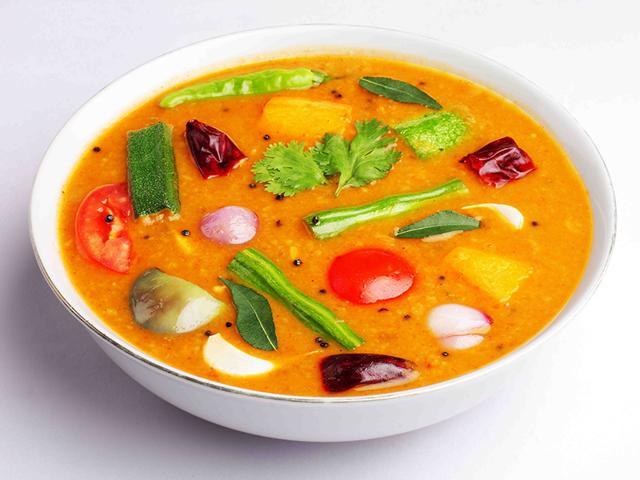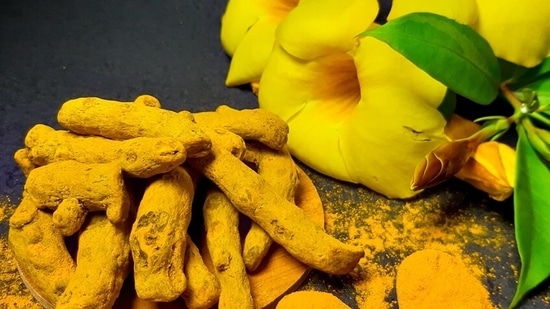What goes into your sambar: 11 ingredients and health benefits of each one of them

Sambar is a medley of vegetables, spices, tamarind and lentils. Each of the ingredients that goes into it contributes to its irresistible taste and nutrition.
Sambar, the flavoursome and nutritious lentil stew, is no longer just a staple in every South Indian household, but over a period of time has gained popularity across the country and even in global cuisines. Perhaps one of the tastiest versions of the humble toor dal that's usually consumed with a tadka of cumin, spices and ghee in North Indian households, sambar with its tangy, spicy, and wholesome appeal has delighted foodies from several parts of the world. Sambar is a popular accompaniment to curries in Burmese cuisines and is also a part of Sri Lankan and Maldivian cuisines. According to food historian K. T. Achaya, sambar's earliest mention in literature goes back to the 17th century in Tamil Nadu when it was exclusively prepared by Iyengar Brahmins. The word sambar originates from Tamil word champāram.
Sambar is a medley of vegetables, spices, tamarind and lentils and each of the ingredients that goes into it, contributes to its irresistible taste and nutritious value. In this article, we will break down health benefits of all the ingredients that go into sambar.
"Sambar, is the most loved traditional south Indian dish with varieties of flavours and types of innovative ingredients added depends on each region. No South Indian house goes without sambar at least 3 times a week. It is also a main dish as well as an accompaniment with many dishes like rice, idly, dosa, vada etc," says Haripriya N, Executive Nutritionist, Cloudnine Group of Hospitals, Chennai, T Nagar.
Apart from the taste and the aromatic flavour of this dish, it is also important to look into the health benefits of consuming sambar. The lentil curry is a combination of ingredients like Toor daal, Tamarind, onion, vegetables of choice (okra, potato, spinach, gourd vegetables, broad beans, carrot), tomato, curry leaves, turmeric, cumin seeds, methi seeds, mustard seeds, red chilli powder, coriander powder, sambar powder.
This mix of ingredients has its own health benefit which makes this dish a healthy combo and is a great way to include the daily dose of vitamins and minerals in your diet.
HEALTH BENEFITS OF SAMBAR AND ITS INGREDIENTS
Haripriya N also explains health benefits of sambar ingredients:1. Toor daal: It is a source of protein and B complex vitamins. Lante carbs (carbs from pulses) help to stabilize blood pressure, improves gut health, and makes you feel satiated. If you are on a weight loss journey, this is the perfect way to feel full and curb those hunger pangs.
2. Tamarind: Imli provides sambar a sweet and sour taste that enhances the taste of the dish. It also has antioxidants (beta- carotene), and magnesium that reduces inflammation and prevents autoimmune and inflammatory diseases.

3. Onion: It is rich in potassium, quercetin and anthocyanins (antioxidant) B vitamins, including folate and B6 plays an important role in RBC production and nerve function.
4. Vegetables of choice: The common seasonal vegetables which are usually included in the sambar are high in fibre, potassium, phosphorus, zinc, and phytochemicals which prevents constipation, enhances the nutrient absorption, improves digestion. Okra, potato, spinach, gourd vegetables, broad beans, and carrot are some of the vegetables that usually go into your sambar.
5. Tomato: A good source of vitamins - lycopene, vitamin C, potassium, vitamin K1, vitamin B9, it acts as an antioxidant and the essential nutrients in it are beneficial for heart disease prevention and an important factor for blood clotting and tissue growth and cell function.
6. Curry leaves: They have alkaloids, glycosides, and phenolic compounds that give this fragrant herb potent health benefits by acting as an antioxidant. They also prevent inflammation and other metabolic conditions.
7. Turmeric: It has potent antioxidants. Curcumin prevents and treats arthritis, gout or any other inflammatory condition.

8. Cumin seeds: It is a rich source of iron, has flavonoids and alkaloids which helps to improve hemoglobulin, promotes better digestion and boosts immunity.
9. Methi seeds: It is rich in vitamins such as thiamine, riboflavin, folic acid, niacin, vitamins A, B6, C, and K. It also contains minerals such as copper, potassium, calcium, and iron, selenium, zinc, manganese, and magnesium. Beneficial in reducing the fasting sugar levels, methi seeds also improve breastmilk secretion, aid in digestion and lower blood cholesterol levels.
10. Mustard seeds: This must-add ingredient is used in tadkas in South India is rich in carotenoids, isorhamnetin, and kaempferol, antioxidants that protect from conditions like type 2 diabetes, heart disease, and perhaps even some types of cancer.
11. Red chilli: Capsaicin is the main bioactive plant compound found in chili peppers, responsible for their unique, pungent taste and many health benefits like wound healing, rich source of vitamin C. They are also helpful in reducing inflammation.
Disclaimer: This Article is auto-generated from the HT news service.











